Can Dogs Eat a Little Bit of Chili? Understanding the Risks
Many dog owners wonder whether it's safe to share a bite of their flavorful, spicy meal with their canine companions. One common question is whether dogs can eat a little bit of chili. While a small taste might not seem harmful, feeding chili or any spicy food to dogs can lead to a range of health issues. In this article, we’ll break down why chili is unsafe for dogs, what symptoms to watch out for, and what to do if your dog accidentally eats some.
Why Spicy Foods Including Chili Are Harmful to Dogs
Chili typically contains capsaicin, the compound responsible for its heat. While not toxic in small amounts, capsaicin can cause significant discomfort and digestive issues in dogs. Dogs have fewer taste buds than humans, so they don’t perceive flavor the same way, but they are still susceptible to the physical effects of spicy compounds.
- Irritation of the mouth and throat: Dogs may experience drooling, sneezing, and coughing.
- Gastrointestinal upset: Vomiting, diarrhea, gas, and stomach pain are common.
- Increased thirst: From irritation and digestive distress.
- Respiratory symptoms: In some cases, spicy food can cause coughing and difficulty breathing.
Dangerous Additives Common in Chili
Aside from the spice, chili often contains ingredients that are downright toxic to dogs, including onion, garlic, and chives. These ingredients can damage red blood cells, causing a potentially fatal condition called hemolytic anemia.
- Symptoms: Vomiting, diarrhea, abdominal pain, rapid breathing, lethargy, pale gums, and in severe cases, collapse.
- Delayed onset: Signs of toxicity may not show up until days after ingestion.
- Higher risk: Small dogs, dogs with preexisting conditions, or those that eat large quantities are at greater risk.
Risks in Store-Bought and Canned Chili
Store-bought chili often contains preservatives, excess fat, sodium, and seasonings that can further harm your dog:
- Too much fat can lead to pancreatitis, a serious and painful condition.
- High sodium can cause sodium ion poisoning.
- Some commercial chili mixes even contain cocoa powder — highly toxic to dogs.
What to Do If Your Dog Eats Chili
If your dog accidentally eats a dish containing chili, take the following steps:
- Provide cool water to soothe the mouth and prevent dehydration.
- Give dairy like yogurt or milk (if tolerated) to relieve mouth burn.
- Wash paws in case chili oils have been transferred from the face or bowl.
- Monitor symptoms: Watch for drooling, vomiting, or abnormal behavior.
- Feed a bland diet: Offer plain boiled chicken, rice, or mashed potato for a few days if your pet has an upset stomach.
- Do not induce vomiting without veterinary advice.
When to Call the Vet
Seek veterinary attention under the following circumstances:
- Your dog is very small, old, pregnant, or has preexisting health issues.
- The chili contained potentially toxic ingredients (onion, garlic).
- Moderate to severe symptoms occur, such as weakness, pale gums, or inability to drink water.
A vet may use treatments such as activated charcoal, IV fluids, or other supportive care depending on the severity of the case.
Safe Pepper Alternatives for Dogs
Bell peppers are a safe alternative to spicy chili and can be offered in moderation. These peppers contain no capsaicin, are rich in vitamins A and C, and provide fiber and antioxidants. Ensure they’re served plain and seeds/stems are removed. However, even bell peppers can cause mild tummy upset if given in excess.
Seasonings That Should Be Avoided
In addition to spicy peppers, seasonings such as chili powder, cayenne, jalapeños, and black or white pepper should be avoided. While black and white pepper aren't toxic, they irritate the digestive tract and respiratory system.
Tips to Prevent Accidental Ingestion
- Keep spicy foods and ingredients out of your pet’s reach.
- Remind family members and guests not to give human food scraps to your dog.
- Stick to a dog-formulated diet or offer plain, dog-safe cooked ingredients when needed.
Conclusion
Chili and other spicy foods should never be part of a dog’s diet. While a small taste may not be fatal, the discomfort and risk of more serious consequences make it unsafe. Always provide treats and meals designed specifically for dogs and consult your vet if accidental ingestion occurs. Keeping a dog-safe kitchen is essential for your pet's long-term health and happiness.





